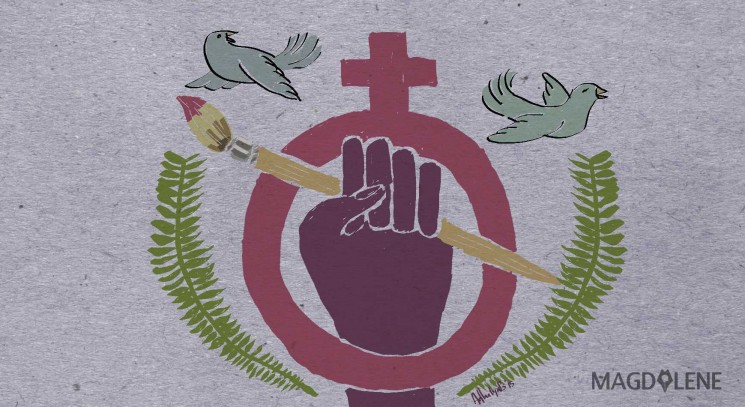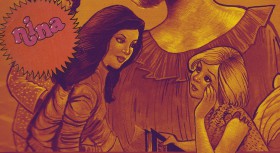There was a sense of both excitement and trepidation upon being asked to take part in the recent Feminist Fest as a moderator for the Feminist Allies panel. While it made sense why I would be chosen for this particular panel, but when stacked up alongside the likes of New Men’s Alliance founder Syaldi Sahude, budding historian (and close friend) Nadya Karima Melati and the Feminist Ulema himself, thoughts like “I may just blabber away instead” or “I don’t think I’m smart enough for this panel” began to appear. What I did not think was that thought I might have been tasked to steer the conversation, I was there to learn too.
To be perfectly honest, the timing was somewhat serendipitous. I had just left a workplace where I had served for four years and, despite having acquired a new stint at a major company prior to resigning and briefly went there, I did not realize that I was suffering from a mental burnout and was not in the mental capacity to take on a full-on, full-time job. Couple that with a flailing love life and the subsequent realization that things were not working out on that front, it was a perfect recipe for disaster. And after an extended period of time attempting to weather the storm, I eventually let it rain on me. I started withdrawing myself from a host of activities, projects and engagements that I had previously said “yes” to, as I was beginning to feel like being pulled into a hundred different directions at the same time, like everyone wanted a piece of me and I was losing all these pieces at the same time.
However, I knew that I was not going to pass on this particular event—as much as I was tempted to at one point or another—because with all these slow-burning realizations, I had come at a crossroad regarding my involvement in the feminist movement: Where do I stand? What purpose do I serve? As much as I identify with the female and the feminine, am I actually qualified to be one? What does it even mean to be a feminist?
There were a lot of points relayed in the event that made a resounding impact on me, one being Syaldi’s own questioning of whether everyone can indeed be a feminist. He contested the fact that there are many self-dubbed “male feminists” out there whose day-to-day behaviours are anything but and how identifying as such actually boosted their privilege because it is widely considered cool to identify as a feminist these days.
“It takes a certain level of awareness to call oneself a feminist,” he said. “One of the things that I’ve learned—and still continue to learn—is to listen. I find that most men find it difficult to listen. And feminism aims to establish the empathy so we can listen.” In spite of his years-long involvement in advancing women’s rights and spreading the awareness on gender equality, he never claimed himself to be a feminist, as it is “a hard task to bear.” However, he remarked that “if anyone says I am, I’ll take it as compliment.”
Kyai Husein Muhammad, who came all the way from his base in Cirebon, exposed at great length the increasingly difficult attempt to reconcile Islam and feminism in an increasingly conservative Indonesia.
“Most Indonesian Muslims take Islamic teachings at face value,” he criticized. He then got up while pointing his head forward with his foot shuffled behind. “If I may describe the current condition in this country, this is how it goes: we, as a society, may think that we are in the new world, but our thoughts remain backwards. And this type of conservatism is dangerous.”
He proceeded to expound Koranic verses that are deemed problematic but actually open to more nuanced and less patriarchal interpretations, while levelling another criticism against his fellow ulemas who have resorted to hate-filled tirades in spreading the messages of Islam, which he finds disheartening. He also attributed the lack of commitment to “developing humanity” among not only religious leaders but also believers to be a massive hindrance when it comes to progress in gender equality.
“This is why at my Fahmina Institute we teach the concept of reciprocity. There are actually many Koranic verses that promote the concept of reciprocity. If people say that men are superior to women, it only means they are superior in certain aspects, not absolutely superior—and vice versa. This line of thought has not only harmed women, but also men,” he concluded.
On the other hand, Nadya highlighted the masculine academic field and the nature of academia. “The credo that science must be rational, methodological, objective and neutral stemmed from white, male, European scientists, and it is a masculine way to observe a matter,” she said. And this is where the feminist methodology comes in handy, as it questions neutrality and enables the inclusion of experience into a scientific product.
“This type of approach also takes side with the oppressed. For instance, when you’re doing a research on the kidnapping of East Timorese children during the annexation of Indonesian troops in the country, you take the stories of the mothers whose children were abducted into account, because these stories are a valid documentation of the matter.”
However, she also levelled criticism against the mere inclusion of women in any study or field, without actually including their opinion or experience, exemplifying the presence of women in the House of Representatives who do not actually voice the aspirations of Indonesian women in general in response to an audience member’s question.
To this, Syaldi also noted that while this type of approach is problematic, “the real challenge is now to open, encourage and solidify the access for women with better skills to be more involved in politics, and I’m confident that the girls and women who are present here today can achieve just that.”
Syaldi also quoted a remark by Kyai Husein Muhammad made earlier in the panel which suggested that the focus on achieving gender equality “must be about the spirit, not the body” in response to another question inquiring whether radical feminism’s suggestion of men not being able to be feminists is true or false.
Nadya warns against misunderstanding the concept of “radical”, because the word actually refers to being deeply entrenched in an idea or concept.
“I suppose if you want to be anything—not just a feminist in this case—you will have to be radical…. It is what all of us need to strive for,” she added.
I was reminded of this article from the Guardian that uses Dolly Parton as an example of a feminist who doesn’t use that term to describe herself, like so many others with a working class background “where a woman’s strength and independence is more about walk than talk.” In it, writer Sarah Smarsh – who hails from a similar background—makes a statement that strikes a deep chord with me: “I’m proud to call myself a feminist but feel no self-satisfaction about my framework for what the word means—a privilege of education and culture most women where I’m from have not experienced.”
This is more or less my current approach to the whole discourse on feminism. I can think of myself as much of a woman as I am a man, and women’s rights issues are my own too; but I’m very much aware of the fact that as a biological male, I have also benefitted from the patriarchal ways of the world. At the same time, they have greatly harmed me, and it is through feminism that I seek to rectify the situation. It’s all too easy to talk one’s way through feminism, but how one lives, breathes and walks feminism is what truly counts at the end of the day. And I believe this is the future of feminism that we need to be headed for. Let’s keep the conversation going.
Fajar Zakhri is a music lover, pop culture connoisseur, intense feeler, deep thinker and queer whatever. A Jakarta native since birth, he works as a linguistic consultant and is also on his way to rockstardom.








Comments